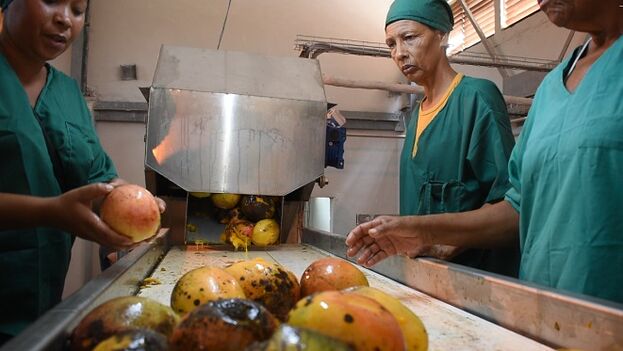The declining Cuban harvests are the culprit

Employees of the fruit processing factory, disappointed with low salaries, denounce poor management by managers
By 14ymedio
HAVANA TIMES – The workers of the Jobabo fruit and vegetable processing factory in Las Tunas are, frankly, disappointed. After a million-dollar investment to renew the industry, the tiny volume of crops forces production to stop frequently, directly affecting their salaries.
The workers tell the official newspaper Periódico 26 that the factory is plummeting, just three months after starting to operate, due to the “bad manners” of the leaders. According to the media, the municipality had not received an investment of that magnitude in the agricultural sector for a decade, but the lack of raw material forces the factory to work intermittently.
In the month of August, for example, the municipality reported the collection of 3.9 tons of mango, 9.5 tons of guava and 13.8 of papaya for the production of jams, sweets and pulp. In an industry with a processing capacity of eight tons per day, the raw material barely lasted three and a half days.
The employees, who understand that “if they don’t produce they don’t earn,” are not satisfied with the factory’s management and demand more transparency with the company’s accounts, which decide, in short, how much they earn.
“When we have the raw material we try very hard. We come to work at 7:00 in the morning and leave at any time in the night. We sell to the countryside, Zabalo, Palo Seco, all with the aim of meeting the required income, but when it comes to our salaries, we don’t get what we think we should,” said Maribel Contreras, one of the workers, who complains that only one of the three paychecks she has received so far has been complete. The rest, she says, don’t exceed the minimum pay.
According to the calculations of the workers themselves, who report that they are not informed of how much they must produce and sell to ensure at least the basic pay, the industry should generate 400,000 pesos to cover all expenses. That amount was exactly what was achieved in August, but even so the workers saw their salaries reduced.
When they went to the managers, they alleged fuel expenses, transportation, partners who had not yet paid and a miscalculation on the part of the workers who, completely uninformed, thought the necessary profits for the industry were about 100,000 or 200,000 pesos below what is estimated to be a satisfactory performance.
“If [the factory] works in a stable way, the daily income would be from about 350,000 to 400,000 pesos, and the salary would be met without difficulty. Some will even earn around 10,000 pesos,” calculates another employee.
The problems of the industry, to which is added that the boiler consumes between 8 and 9.3 gallons of oil per hour in the midst of the fuel crisis, could be alleviated if the management listened to some of the workers’ proposals to increase production and reduce spending. Unfortunately, according to Periódico 26, there is no “appropriate climate” in the company to solve the demands.
“We have to make more arrangements to bring cucumber, onion, chili peppers… all that is pickled and sold quickly. It would make very good profits. It’s a way to generate income, but not enough is done to implement it,” said Armando Santoya, one of the workers, who insists that the factory look for alternatives but receives no response from the bosses.
A similar situation occurred in Granma, where the Porcino company is late in payments to more than 1,000 producers. The news came after one of the province’s pig farmers filed a public complaint against the state in the newspaper Juventud Rebelde on June 14. As of October 2, three months later, the company has not yet formulated its response.
A farmer, Alejandro Sosa, explained that last February he had signed a contract with the provincial company for the sale of a certain amount of animals in exchange for 1,526 MLC (freely convertible currency). The document clearly stipulated that the payment should be made within 90 days, he says, but eight months later there is no news of the money, and the breeder’s pocket has begun to suffer the consequences.
In several meetings, the company’s directors assured him that, although with delays, the debt would eventually be paid off. However, the state-owned company has barely covered the November 2022 contracts. They also offered him to pay him in kind, giving him a ton of feed in exchange for the har currency, for the difference of which he should deliver about 79,200 pesos. The farmer refused, and after several inquiries, he discovered that the line for those who waited for food was just as long as those who waited for hard currency.
“Informally I learned that the director of Porcino in Granma and several other cadres (…) have requested leave from their positions. If it’s true and happens without the payments being resolved, the solution will take even longer,” Sosa told the media. “On the other hand, they have authorized foreign exchange payments to producers who delivered meat long after me, which I consider a lack of seriousness and honesty.”
Translated by Regina Anavy for Translating Cuba
Read more from Cuba here on Havana Times




